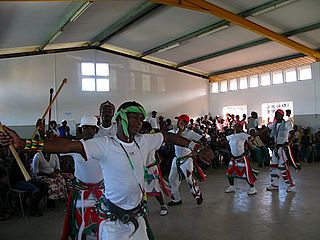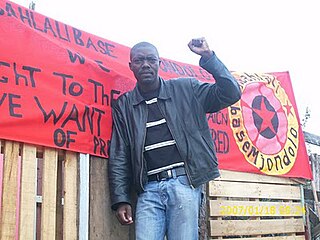Amandla in the Nguni languages Xhosa and Zulu means "power". The word was a popular rallying cry in the days of resistance against apartheid, used by the African National Congress and its allies. The leader of a group would call out "Amandla!" and the crowd would respond with "Awethu" or "Ngawethu!", completing the South African version of the rallying cry "power to the people!". The word is still associated with struggles against oppression.

Abahlali baseMjondolo is a socialist shack dwellers' movement in South Africa which primarily campaigns for land, housing and dignity, to democratise society from below and against xenophobia.
The "Third Force" was a term used by leaders of the ANC during the late 1980s and early 1990s to refer to a clandestine force believed to be responsible for a surge in violence in KwaZulu-Natal, and townships around and south of the Witwatersrand.

Sibusiso Innocent Zikode is president of the South African shack dwellers' movement, which he co-founded with others in 2005. Abahlali baseMjondolo claims to have an audited paid up membership of over 115 000 across South Africa. His politics have been described as 'anti-capitalist'. According to the Mail & Guardian "Under his stewardship, ABM has made steady gains for housing rights."

Kennedy Road is an informal settlement in Durban (eThekwini), in the province of KwaZulu-Natal in South Africa. Formed in the late 1970s or early 1980s, the settlement was mentioned by the African National Congress (ANC) after the end of apartheid but amenities were not improved. The site is mostly not connected to sanitation or electricity. Dissatisfaction with local councillors led to 2005 protests including a road blockade, out of which the shack dwellers movemment Abahlali baseMjondolo (AbM) formed. In 2009, an AbM meeting was attacked resulting in two deaths and a court case. More recently, the municipality has improved facilities and promised to relocate inhabitants.

The Landless People's Movement is an independent social movement in South Africa. It consisted of rural people and people living in shack settlements in cities. The Landless People's Movement boycotted parliamentary elections and had a history of conflict with the African National Congress. The Landless People's Movement was affiliated to Via Campesina internationally and its Johannesburg branches to the Poor People's Alliance in South Africa.
Sibusiso Joel "S'bu" Ndebele is the former Minister of Correctional Services serving from 2012 to 2014. He has been on the National Executive Committee (NEC) of the African National Congress (ANC) since 1997, and was the Provincial Chair of the ANC from 1998 to 2008.

UnFreedom Day is an unofficial annual event that is marked every year on or around 27 April. UnFreedom Day is organised to counter the official South African holiday called Freedom Day, an annual celebration of South Africa's first democratic elections in 1994.

The Poor People's Alliance was network of radical grassroots movements in South Africa. It was formed in 2008 after the Action Alliance, formed in December 2006, was expanded to include two more organisations. It become defunct following the collapse of two of its affiliated movements, the Western Cape Anti-Eviction Campaign and the Landless People's Movement.
No Land! No House! No Vote! is the name of a campaign by a number of poor people's movements in South Africa that calls for the boycotting of the vote and a general rejection of party politics and vote banking. The name is meant to imply that if government does not deliver on issues important to affected communities these movements will not vote.

Mzonke Poni is an activist in Cape Town. He is the former chairperson of Abahlali baseMjondolo of the Western Cape and was previously a leader of the Western Cape Anti-Eviction Campaign. The Sunday Times has described him as "the face of an ANC nightmare - an angry activist mobilising the township masses to protest at what he calls the government's failure to create a better life for the poor."
South Africa has been dubbed "the protest capital of the world", with one of the highest rates of public protests in the world.
Willies Mchunu was the 7th Premier of KwaZulu-Natal province in South Africa. He was previously a Member of the Executive Council (MEC) for the Department of Transport, Community Safety, and Liaison in the province. He is a member of the African National Congress and the former chairperson of the South African Communist Party (SACP) in KwaZulu-Natal and is a member of the Central Committee of the SACP. He is seen as a close ally of former South African President Jacob Zuma.

The KwaZulu-Natal Elimination and Prevention of Re-emergence of Slums Act, 2007 was a provincial law dealing with land tenure and evictions in the province of KwaZulu-Natal in South Africa.
The attack on Kennedy Road in Durban, South Africa, occurred on 26 September 2009. A mob of men armed with bush knives, guns and bottles entered the Kennedy Road informal settlement searching for leaders of the shackdwellers movement Abahlali baseMjondolo (AbM). They looted shacks and threatened residents, before attacking a hall where a youth meeting was happening. Two people were killed and around a thousand were displaced. In the aftermath, AbM representatives such as S'bu Zikode went into hiding and thirteen AbM members were arrested.
Michael Sutcliffe is the former municipal manager of the eThekwini Metropolitan Municipality, which includes the city of Durban, South Africa. During his time in the position he was widely reported to be a controversial figure amongst Durbanites and was the target of popular protest in the city.
The Constitution of South Africa protects all basic political freedoms. However, there have been many incidents of political repression, dating back to at least 2002, as well as threats of future repression in violation of this constitution leading some analysts, civil society organisations and popular movements to conclude that there is a new climate of political repression or a decline in political tolerance.
There have been many political assassinations in post-apartheid South Africa. In 2013 it was reported that there had been more than 450 political assassinations in the province of KwaZulu-Natal since the end of apartheid in 1994. In July 2013 the Daily Maverick reported that there had been "59 political murders in the last five years". In August 2016 it was reported that there had been at least twenty political assassinations in the run up to the local government elections on the 3rd of August that year, most of them in KwaZulu-Natal.
In March 2013 around a thousand people occupied a piece of land in Cato Crest, Durban and named it Marikana after the Marikana miners' strike. Mayor James Nxumalo blamed the occupation on migrants from the Eastern Cape. He was strongly criticised for this by the shack dwellers' movement Abahlali baseMjondolo who said that "The City Hall is red with blood".










